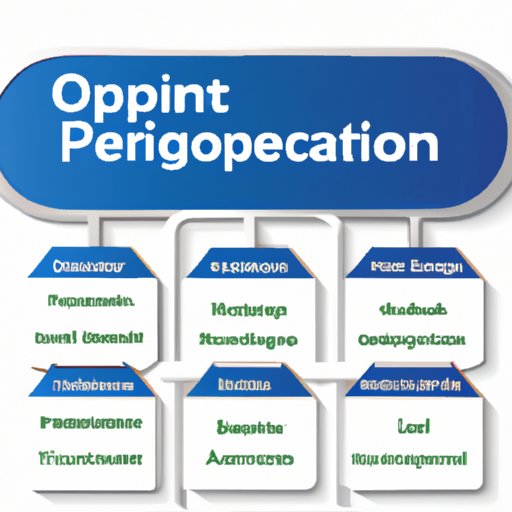Introduction
Operational leadership is a style of management that focuses on driving efficiency and productivity in an organization. It is concerned with the day-to-day operations of the business, from setting goals and objectives to monitoring performance and providing feedback. In this article, we’ll explore what operational leadership is, the principles and practices of effective operational leadership, and the benefits it can bring to your organization.

Exploring the Role of Operational Leadership
Operational leadership involves directing the activities of employees and resources to achieve organizational objectives. It is focused on ensuring that tasks are completed on time and within budget, while also working to maximize efficiency and effectiveness. Operational leaders must have strong problem-solving skills, be able to handle complex situations, and be comfortable making decisions quickly.
Characteristics of Effective Operational Leaders
Effective operational leaders are organized, decisive, and have excellent communication skills. They understand the importance of setting clear goals and objectives and communicating these to their team. They also know how to motivate their team, delegate tasks effectively, and provide timely feedback. Finally, they are able to identify and address any problems or issues that arise quickly and efficiently.

Principles and Practices of Operational Leadership
In order to be successful at operational leadership, there are certain principles and practices that need to be followed. These include having a clear vision for the organization, setting achievable goals, and developing effective strategies for achieving those goals. Additionally, operational leaders need to have a solid understanding of their team and be able to provide the necessary resources and support to enable them to reach their goals.
Key Principles of Operational Leadership
The key principles of operational leadership are as follows:
- Set clear and achievable goals;
- Develop strategies to reach those goals;
- Provide resources and support to help the team reach their goals;
- Monitor progress and provide feedback;
- Be willing to make changes when needed;
- Maintain open communication with the team; and
- Be flexible and adaptable.
Practical Strategies for Successful Operational Leadership
To ensure operational leadership is successful, operational leaders should use the following practical strategies:
- Set measurable objectives and track progress;
- Encourage collaboration and innovation;
- Encourage employees to take initiative and ownership;
- Focus on continuous improvement;
- Develop a culture of accountability;
- Provide regular feedback;
- Recognize and reward good performance; and
- Encourage open communication.
The Benefits of Operational Leadership
When operational leadership is done correctly, it can have a number of benefits for the organization. These include improved efficiency and productivity, increased employee engagement, and enhanced innovation and creativity.
Improved Efficiency and Productivity
Operational leadership helps to ensure that tasks are completed more efficiently and effectively, leading to improved productivity. This can result in cost savings for the organization, as well as increased profits.
Increased Employee Engagement
Operational leaders are able to create an environment where employees feel valued and motivated. This leads to increased engagement and a sense of purpose, which can result in higher levels of job satisfaction and improved performance.
Enhanced Innovation and Creativity
Operational leaders are able to foster a culture of innovation and creativity by encouraging experimentation and risk-taking. This can lead to new ideas, products, and services, which can give the organization a competitive edge.
Developing Operational Leaders in Your Organization
If you want to develop operational leaders in your organization, there are a few steps you can take. The first step is to identify potential candidates who possess the necessary skills and qualities. Once you have identified potential candidates, you can then provide them with training and mentoring programs to help them hone their skills. Finally, it is important to provide regular feedback and performance management to ensure they are meeting their goals.
Case Studies of Effective Operational Leadership
To illustrate how operational leadership can be effective, let’s look at three case studies of successful operational leaders:
Example 1
John is a successful operational leader at a large manufacturing company. He has established clear goals and objectives for his team and provided them with the resources and support they need to reach those goals. He is also quick to identify and address any issues that may arise. As a result, his team is highly productive and efficient.
Example 2
Sue is an operational leader at a small start-up. She understands the importance of fostering a culture of innovation and creativity, so she encourages her team to experiment and take risks. She also provides them with regular feedback and recognition for their efforts. Her team is highly engaged and motivated, and they have been able to develop some innovative new products.
Example 3
Bob is an operational leader at a large retail company. He has implemented a system of performance management that allows him to track the progress of each team member. He also provides regular feedback and rewards good performance. As a result, his team is highly efficient and productive.

How Technology is Changing Operational Leadership
Technology is increasingly playing a role in operational leadership. Automation is allowing organizations to increase efficiency and reduce costs, while data analysis is helping to identify trends and opportunities for improvement. Additionally, remote communication tools are enabling teams to stay connected, even when they’re not in the same physical location.
Conclusion
Operational leadership is a critical component of any successful organization. It involves setting clear goals and objectives, providing resources and support, and monitoring progress. It also requires strong communication and problem-solving skills. By following the principles and practices outlined in this article, organizations can reap the benefits of operational leadership and ensure their teams are productive and efficient.
(Note: Is this article not meeting your expectations? Do you have knowledge or insights to share? Unlock new opportunities and expand your reach by joining our authors team. Click Registration to join us and share your expertise with our readers.)
